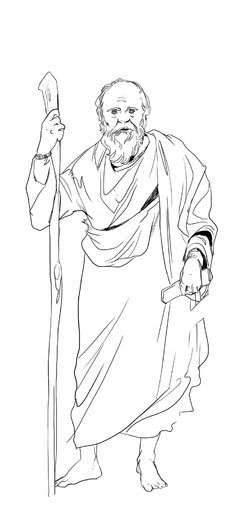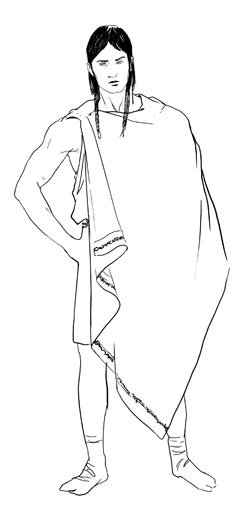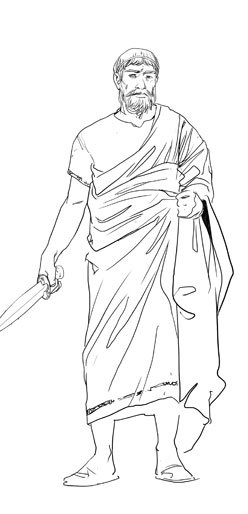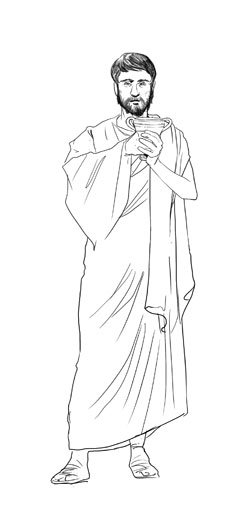
POLIS: The Trial of Socrates
A quick explanation of the title: I am really fascinated by the Peloponnesian War - the decades-long conflict between Athens and Sparta in the 5th century BCE - and Polis is the title I'm using for that over-arching story. However, I wanted to focus on something a little simpler and smaller, and so I've chosen to start at the end of the Peloponnesian War. This is a graphic novel that will tell the story of Socrates' death as well as his student Plato's spiritual birth. So, The Trial of Socrates is meant to be a kind of sub-title for what could be a very long project.
I received some initial sketches from artist Gian Fernando, and I am very pleased with the progress so far. These are still rather rough sketches, but they give a strong indication of where these characters are going.
I've posted them below, along with a short description of each character. Thanks for taking a look!

Socrates
(470-399 BCE)Much of what we know about Socrates comes from his most famous student, Plato. A self-proclaimed gadfly, Socrates spent his later years challenging and questioning the traditional ideas and assumptions of those around him. He sought to find a fundamental truth on which to build a new ethics. Plato later took this mission even further, and it is hard to tell where Socrates ends and Plato begins in the latter’s Dialogues.
All agree that Socrates infuriated many people in Athens. In the end, he was prosecuted for impiety and corruption of the youth. Rather than show remorse, he doubled-down and said the court should kill him. So they did.

Aristocles
(428-348 BCE)Student of Socrates, and teacher of Aristotle, not much is known about Aristocles’ early life. History knows him as Plato, but this is thought to be a nickname earned by his broad shoulders and his wrestling prowess.
As a young man, Aristocles experienced two major events that affected his later life. One was the Peloponnesian War between Athens and Sparta. Aristocles served Athens for a brief time, between 409 and 404 BCE, until Athens was defeated and Sparta replaced its democracy with a restrictive oligarchy. Two of Aristocles’ relatives, Charmides and Critias, were prominent figures in the new government, but they were killed after a brief civil war.
The other major event was Aristocles’ friendship with Socrates. Socrates’ method of dialogue and debate impressed him so much that he soon he became a close associate. It is Socrates’ execution, however, that truly shook the young man and caused him to dedicate his life to the question of virtue and the formation of a noble character.

Critias
(460-403 BCE)An aristocrat and philosopher in his own right, Critias was Aristocles’ cousin and a former associate of Socrates. His name appears several times in the history of the Peloponnesian War, but the details of his participation are unclear. Exiled before war's end, Sparta made him one of the members of the restrictive oligarchy they installed to replace Athens’ democracy.
Critias became one of the leaders of what history calls the Thirty Tyrants. Their brutal reign of terror in 404/403 BC was vividly depicted by Xenophon (Hellenica, Book 2). The reign of terror unleashed by the Thirty saw summary executions, property confiscations, and the exile of thousands. When the democratic exiles returned to retake the city, Critias was killed in battle.

Theramenes
(455-403 BCE)Theramenes was an Athenian statesman, prominent in the final decade of the Peloponnesian War. He was particularly active during the two periods of oligarchic government at Athens, as well as in the trial of the generals who had commanded at Arginusae in 406 BCE. A moderate oligarch, he often found himself caught between the democrats on the one hand and the extremist oligarchs on the other. In fact, he was nicknamed the Buskin – a boot that could be worn on either foot – due to his fluidity in changing sides.
As a member of the Thirty Tyrants, he sought to restrain some of their more despotic behavior. Critias condemned him to death shortly before the oligarchy was defeated.

Crito
(469-? BCE)Crito of Alopece was a long-time friend of Socrates. They were associates possibly since childhood. Crito was a fairly wealthy farmer, but he was not an intellectual like Socrates and most of his circle.
Perhaps unfairly to the real man, in this story he will be a bit of comic relief.
Thanks for the support and any feedback! I should have some more detailed character designs to show later next week. I hope you'll follow me and watch it all come together.
